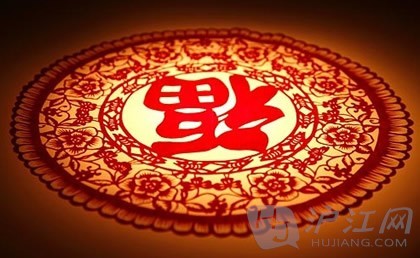|
|
传统追溯:春节“福”字为何要倒贴?(图) 春节“福”字为何要倒贴? 春节“福”字为何要倒贴?The Chinese character “fu” means good fortune and happiness, and during Spring Festival virtually every family would paste it upside down on their doors in the hope that the word could bring blessings to their families. As to why “fu” should be placed upside down there are three interpretations. 中国汉字“福”意味着好运和幸福。每到春节,几乎每个家庭都会将“福”字倒贴在家里的门上,以希望这个字能给家人带来祝福。为什么“福”字要倒着贴呢?这里有三种解释。 The first interpretation has the practice of pasting “fu” during Spring Festival originate in Jiang Ziya of the Zhou Dynasty (11th Century-256 B.C。). When Jiang Ziya was made a god, his wife demanded to be made a goddess. “After I married you I was always in poverty in my life,” Lord Jiang said. “It seems you are destined to be poor. So let me appoint you as the Goddess of Poverty.” 第一种关于春节贴“福”字的习俗跟周朝(公元前11世纪-前256年)的姜子牙有关。姜子牙成仙以后,他的妻子请求姜子牙将她封仙,“自从我们成亲以后,我一直过得很困苦。”姜子牙说道,“似乎你命中注定就该贫穷,所以我封你为‘穷神’。” No knowing what being the Goddess of Poverty held in store for her, his wife was nevertheless happy about becoming a goddess. Cheerfully, she asked, “Now that I'm the Goddess of Poverty, where shall be my domain?” Jiang replied, “You are off limits wherever there is good fortune” When the residents got word of Jiang's instruction, they wrote the character “fu” on paper and pasted it on the doors and windows of their houses to keep the Goddess of Poverty away. Thus pasting “fu” during the Spring Festival became a Chinese tradition. 虽然不知道‘穷神’意味着什么,他的妻子还是很高兴能被封神。她高兴地问道:“既然我已经被封为‘穷神’,那我该管辖哪里呢?”姜子牙答道:“有好运的地方你都禁止踏入。”居民们听到姜子牙的指示,就在纸上写下“福”字贴在家里的窗户上以赶走“穷神”。久而久之,春节贴“福”字就成了一种传统。 The second interpretation ascribes the practice to Zhu Yuanzhang, the founding emperor of the Ming Dynasty. One year, on the 15th of the first lunar month, Zhu went incognito on a fact-finding inspection tour. When he arrived at a town he saw people huddle together and watch a painting that poked fun at women of west Anhui refusing to have their feet bound by featuring a bare-footed woman holding a large watermelon in her arms. 第二种解释跟明朝开祖皇帝朱元璋有关。某一年第一个月圆之夜,朱元璋秘密外出巡查,当他来到一个小镇时,他发现一群人挤在一起,围观一幅妇女的画。画上的妇女赤着脚,手里抱着个大西瓜,这幅画是取笑安徽西部不裹脚的妇女们。 The emperor, however, misconstrued the meaning of the painting, thinking that people were laughing at his wife, Empress Ma. Who came exactly from west Anhui. Returning to his palace he sent some soldiers to look into the matter. He particularly wanted to know who were those people watched and commented on the painting, and who was the painter. 这位皇帝看到这幅画误以为人们是在嘲笑他的皇后马氏,因为大脚马皇后就来自安徽西部。回到皇宫后他就派士兵去调查此事。他命令追查到底有哪些人对这幅画评头论足,还有这幅画的作者到底是谁。 He also asked the soldiers to paste “fu” on the doors of those who did not join in the crowd. Two days later, another team of soldiers arrived in town to arrest people from the houses whose doors were not marked with “fu” on charges of scoffing at the queen. Since then the Chinese have been pasting “fu” on the doors of their houses to shun trouble. 他还命令士兵将没有参与这件事的人家贴上“福”字。两天后士兵来到那些没贴“福”字的人家里,将那些人以嘲讽皇后的罪名抓走了。从此以后,中国人就在家门上贴上“福”字以躲避灾祸。 The third interpretation attributes the practice to Fu Jin, the Princes of Gong of the Qing Dynasty. Once, on the lunar New Year's Eve, the butler of the mansion of the Prince of Gong wanted to curry favor with his master. 第三种解释跟清朝的恭亲王福晋有关。某一年春节,亲王家的管家想讨主子欢心。 He followed past practice and had several large “fu” written and pasted on the front gates of the warehouse and the mansion. One of the men sent to do the pasting was illiterate and put the character upside down on the front gate of the mansion. Enraged, Fu Jin wanted to punish the perpetrator by whipping him. 他遵照传统,命人在库房和王府大门上贴了几个大大的“福”字。有个奴才因为不识字将王府大门的“福”字贴倒了。福晋因此十分生气,打算鞭打那个犯错的人。 The butler, who had the gift of the gab, hastened to go down on his knees and pleaded: “Your humble servant often heard people say that Your Excellency is a man of longevity and great fortune. Indeed, great fortune did arrive today; it is a good sign。” Fu Jin was convinced. “This is why the passers-by were saying that great fortune had arrived in the mansion of the Princess of Gong,” she thought, “Once an auspicious saying is repeated for a thousand times, my wealth could increase by 10,000 taels of gold and silver.” 这个大管家能言善辩,赶紧给主子跪下求情:“奴才常听人说亲王寿高福大造化大,如今大福真的到(倒)了,乃吉庆之兆。”福晋听罢心想,怪不得过往行人都说恭亲王府福到(倒)了,吉语说千遍,金银增万贯。 She then awarded the butler and the servant who pasted the paper upside down fifty taels of silver. Since then the practice of pasting “fu” upside down during Spring Festival has become a tradition followed by both imperial aristocrats and commoners. 福晋一高兴, 便重赏了管家和那个贴倒福的奴才。从此以后,春节倒贴“福”字就成了封建贵族和普通百姓的共同传统。 网友评论
|
||||||||||||||



